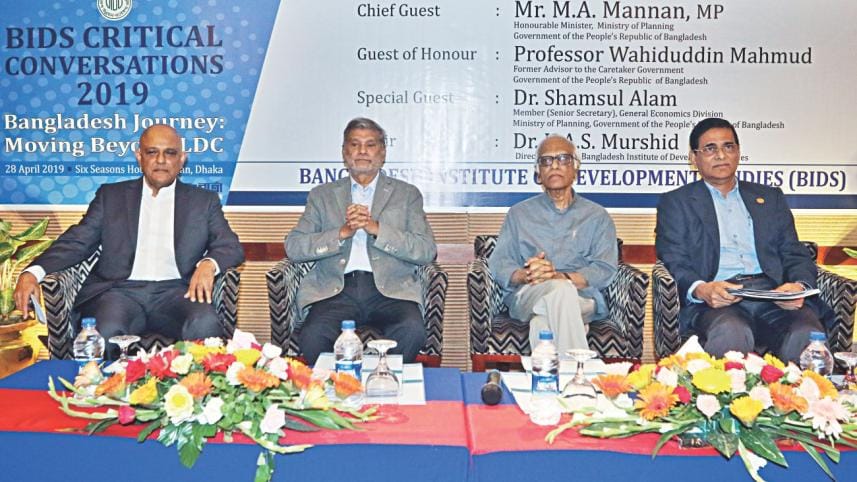Assess social costs of large infrastructure projects

Fixing priorities and assessing the social costs and economic benefits of large infrastructure projects have become important for Bangladesh as many of them are funded by costly suppliers’ credit, said Prof Wahiduddin Mahmud yesterday.
“There are some eye-catching projects. But it is urgent to fix priority. I think a critical review is necessary,” the economist said.
His comments came at the opening of a two-day event, BIDS Critical Conversations 2019, organised by the Bangladesh Institute of Development Studies (BIDS) at Six Seasons Hotel in Dhaka.
Mahmud, a former adviser to a caretaker government, said large projects were being taken by the government for the development of the country and research should be carried out to assess the social cost and the benefit of the big projects from the economic point of view.
“It is necessary to see whether building a tunnel under the Karnaphuli river is more important than building a tunnel under the Buriganga river. Or is it really necessary to build a tunnel in view of other infrastructure requirements?” he said.
He said the government accepts supplier’s credit and undertakes large projects based on the source of funds and these are increasing the loan burden for the country.
Mahmud attached importance on ensuring accountability in economic management.
“We have come to a one-party dominant system of government. Under this system, an accountability mechanism should be established at all stages,” he said, adding that Malaysia, South Korea, China and Vietnam had ensured accountability at all stages of economic management.
He suggested performance-based support to industries instead of cronyism.
Mahmud, a former professor of the economics department at the University of Dhaka, called for an active civil society and free media, saying that those were essential to establish accountability in society.
“Free media is urgently necessary as democratic institutions are not strong enough.”
He said Bangladesh has made strides in various social indicators using low-cost technologies and by creating awareness. But with the economy growing, increased investment will be required for further improvement in the indicators.
“Otherwise, disparity will widen,” he said.
Mahmud also talked about education and employment, saying it has to be looked at whether the education being provided at present was suitable for employment.
Planning Minister MA Mannan said he was confused about the job-seeking behaviour of many educated youths. “They want jobs of their choice. Will the market respond to their demands?”
“You will have to adjust yourself with the market. You do not want to go outside Dhaka and stay in Dhaka at any cost. How do we arrange this type of job?” he said, addressing youths.
On building the tunnel under the Karnaphuli river, the minister said there were other values apart from simple economic returns.
“Our young generation is charged. They are enthused as we are setting up the Rooppur nuclear power plant and building tunnels. They are the ones who will reap the benefit,” he said.
The government is planning to build another tunnel under the Jamuna river, according to the minister. “We are also thinking that instead of building bridges, the construction of tunnels will be environmentally safer and better.” At the event, Prof Shamsul Alam, a member of General Economics Division of the planning ministry, stressed the need for increased budgetary allocation for research. “$1 spent in research results in $10 return,” he said.
BIDS Director General KAS Murshid said inequality has risen and there are pockets of severe poverty.



 For all latest news, follow The Daily Star's Google News channel.
For all latest news, follow The Daily Star's Google News channel.
Comments